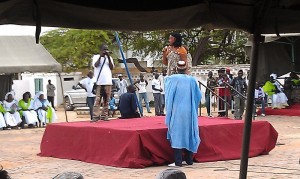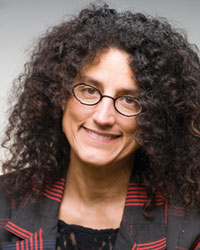Editor’s Note: Nancy Anderson received a Sponsored Research Grant this year to further her investigation in public health policy in Sub-Sahara Africa. Currently she is co-teaching, Public Health and Economic Development in Sub-Saharan Africa with Tom Womeldorff.
I spent seven weeks in Senegal during Summer 2012 working with PROMETRA International, based in Dakar. The overall mission of PROMETRA is to facilitate and promote the inclusion of traditional healers in the formal health systems throughout the continent of Africa. They received a substantial grant from Bill and Melinda Gates Foundation to carry out a survey of Immunization and Maternal-Child Health Knowledge, Attitudes and Perceptions among traditional healers and community leaders. They invited me to Dakar to review the study findings, undertake discussions with staff as well as traditional healers, and suggest considerations for further research.
While the field survey was complete by the time I arrived, extensive reports were still in draft status, translated from French in English by staff who were not entirely comfortable with English prose writing. I reviewed all available reports in both French and English, interviewed staff as well as senior management/directors, conducted a literature review, and completed extensive revision of the report (including review of data/results) into the English language in consultation with Dr. Erick Gbodossou, the president of PROMETRA International.
In addition, I visited a large traditional healing center in Fatick, interviewed traditional healers who had participated in the study, and visited a “western” community hospital to compare the practices germane to maternal child health in both settings. I participated in the dissemination campaign/march in the city of Dakar, a meeting where the results of the study were disseminated community-wide in an urban setting where community need for maternal-child health services is acute.

An image from a skit about traditional healers at the public dissemination meeting that discussed the study findings from the Gates Foundation funded study. Photo taken by: Nancy Anderson
A number of studies examining community uptake of vaccines have been performed in the developing world, and most have focused on issues of resources, infrastructure, and competency. In my analysis of the study results, I found that the PROMETRA study offered a unique perspective that has not been considered in previous research. Specifically, the significant differences between the endogenous definition of immunization and the “western” biomedical definition are an obstacle to community acceptance of vaccine programs and must be recognized before the target community will be entirely comfortable with the use of vaccines as a component of primary care. In addition, my consideration of study results indicates that the endogenous definition of immunization is in many ways more closely allied with the comprehensive World Health Organization definition of primary care than the biomedical definition. Finally, it is also apparent that the population at highest risk of death from vaccine-preventable disease is also in need of all of the other prerequisites for health and wellbeing. These include respect for endogenous culture and traditions as well as household food security. I have written a draft paper that highlights the findings that I consider most unique to this study, and it is attached electronically.
As important as anything I’ve written so far is what I learned (and not for the first time) about a small corner of Africa. Our newspaper headlines that consistently point the inky spectral finger at tragedy cannot possibly capture the sheer beauty and chaos of everyday life, the unmistakable, unforgettable, and overwhelming odor of ripe mangoes mixed with burning garbage, the resilience of humanity in the face of unimaginable challenges. It is a place that deserves everything and still gets too little. Thank you so much for the Sponsored Research grant, a chance to offer my modest skills and to get so much in return.


